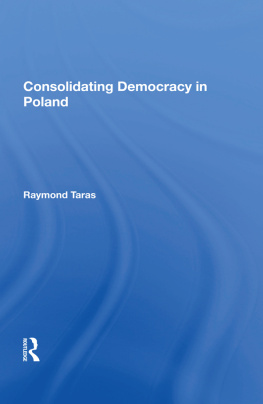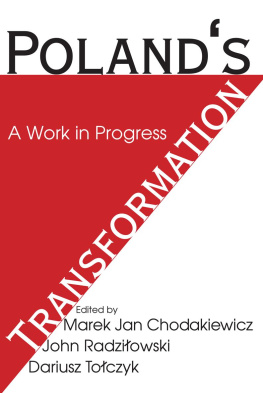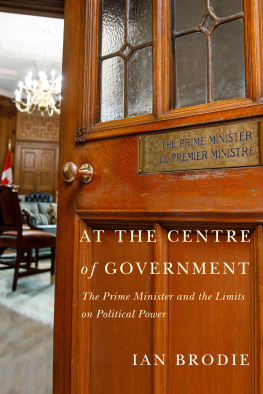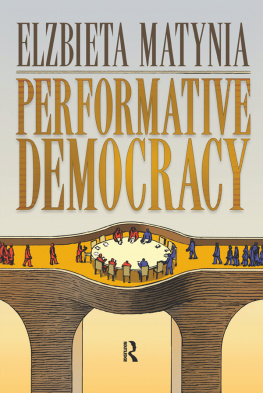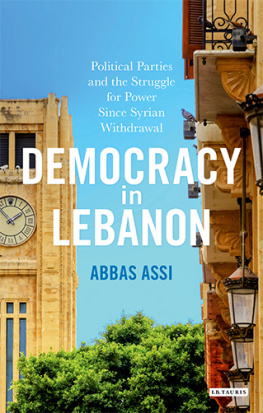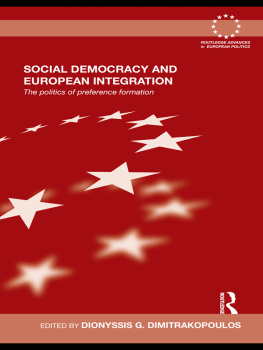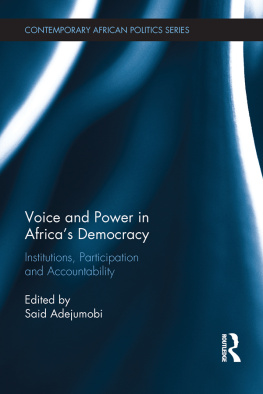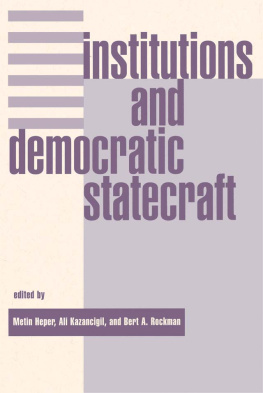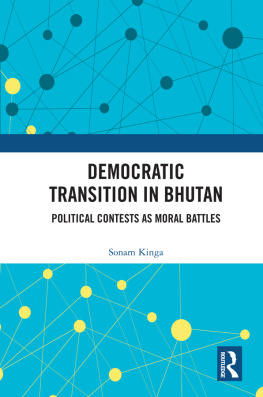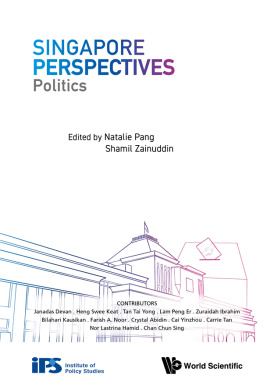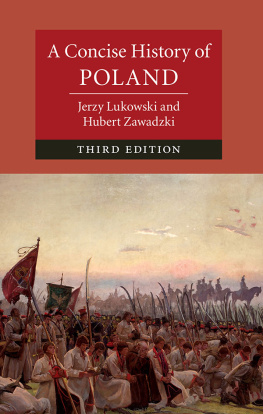Consolidating Democracy in Poland
First published 1995 by Westview Press
Published 2018 by Routledge
52 Vanderbilt Avenue, New York, NY 10017
2 Park Square, Milton Park, Abingdon, Oxon OX14 4RN
Routledge is an imprint of the Taylor & Francis Group, an informa business
Copyright 1995 by Taylor & Francis
All rights reserved. No part of this book may be reprinted or reproduced or utilised in any form or by any electronic, mechanical, or other means, now known or hereafter invented, including photocopying and recording, or in any information storage or retrieval system, without permission in writing from the publishers.
Notice:
Product or corporate names may be trademarks or registered trademarks, and are used only for identification and explanation without intent to infringe.
Library of Congress Cataloging-in-Publication Data
Taras, Ray, 1946-
Consolidating democracy in Poland I Raymond Taras.
p. cm.
Includes bibliographical references and index.
ISBN 0-8133-1463-1.ISBN 0-8133-1464-X (pbk.)
1. PolandPolitics and government1989- 2. DemocracyPoland
History. 3. PolandHistory. I. Title.
JN6752.T37 1995
320.943809049dc20
95-30556
CIP
ISBN 13: 978-0-367-00460-6 (hbk)
No one theoretical framework can make sense of such diverse and multilevel phenomena as regime change, separation of power, electoral realignment, and capitalist transformation in a country. Since describing democratic consolidation in Poland requires us to examine these and associated phenomena, I acknowledge the inspiration I have obtained in recent years from several political science theorists. Gabriel Almond renewed my interest in the regime-change framework that orders this study. Philippe Schmitter talked to me about transition moments and democratic consolidation in imaginative ways that the printed word could never do justice to. The late Aaron Wildavsky was as creative a political scientist as there has been, and he confidently led initiates through the grid-group gates of cultural theory. During the summer of 1994 I participated in a seminar on democracy, development, and civil society organized by the Institute for the Study of Economic Culture at Boston University. Its director, Peter Berger, kept the focus on the cultural prerequisites for free-market success. If this book, then, explores a variety of theoretical approaches and recognizes the value of a healthy dose of epistemological relativism, it is because I have been infected by the enthusiasm and have been largely persuaded by the argumentation of these theorists.
I am very grateful to Krzysztof Jasiewicz of the Polish Academy of Sciences and Washington and Lee University for critically reviewing the postcommunist chapters in this book. I also acknowledge the many constructive comments on the manuscript given by an anonymous reviewer. I thank Curt Pendergraft for expert assistance with the graphics. Susan McEachern of Westview Press has offered me consistently good advice and encouragement. Barbara Metzger provided unassailable editing of the manuscript. Jo Ellen Miller has always kindly provided me with professional secretarial support. I gratefully acknowledge their contributions.
An empirical study is only as good as its source material. Whenever I visit Poland, Regina Kacprzyk has considerately set aside a large stack of periodical literature for my use. Julita Wroniak has faced many an embarrassment on my behalf in asking at bookstores for the memoirs of disgraced communist officials. I can count on Tomek Mirkowicz to track down the most obscure books or the wildest rumors. Jan Trzciski has sensitized me to the extraordinary difficulties that an earlier generation of democratic Poles had to face.
When asked what influence Marxism had exerted on him, former British Labour Party Prime Minister Harold Wilson is said to have replied, I never got beyond page three of Das Kapital It is an answer my wife, Magosia, might give if she were asked about the influence of my work on her. I admire her, as well as my sons, Micha and Krzysztof, for doing their own work so well.
Finally, I hope readers will be understanding about the mistakes I have made in this book. I have strived diligently to cross the s and dot the s. I have also sought to keep track of the changing names, alliances, and leaders of political parties and of the changing party affiliations of politicians. It is a task conducive to acquiring a neurosis. I am grateful for readers forebearance.
Raymond Taras
Scholarly writing about politics in Central and Eastern Europe in recent years has been largely concerned with the transition from communism to democracy and capitalism. The historic changes that took place in the countries of the region in 1989 have justifiably inspired extensive research aimed at explaining why the Soviet bloc suddenly crumbled and liberal democracy quickly found many public advocates and few public adversaries. Further archival research, interviews, and surveys need to be conducted to shed as much light as possible on the momentous events that led to the democratic breakthrough.
This book is different. It is primarily concerned with whether, in the Polish case, the transition has led to a stable and consolidated democracy. Questions about which party holds power, who is likely to win the next presidential election, and when Poland can expect to join the European Union and the North Atlantic Treaty Organization are important, of course, and I examine these issues carefully. But to discover the broader meaning of the answers to these questions it seems useful to introduce the dichotomous variable of consolidated versus unconsolidated democracy. This approach allows me to map clearly what the country has achieved since 1989.
The test for determining whether democracy has been consolidated is that identified by the political scientist Adam Przeworski: Democracy is consolidated when it becomes self-enforcing, that is, when all the relevant political forces find it best to continue to submit their interests and values to the uncertain interplay of institutions. In all these cases, consolidated democracy has to meet procedural criteria and a legitimacy test, that is, whether its rules and constraints are accepted by all politically significant groups. Testing consolidation using these criteria allows us to overcome the tautological fallacy of simply associating consolidation with stability, the passage of time, or the absence of regime reversals.
Focusing on consolidation is important because there is no guarantee that it will occur in a given country. Zbigniew Brzezinski has cautioned that though the notions of democracy are fashionable, in much of the world the practice of democracy is still quite superficial and democratic institutions remain vulnerable. In examining consolidation in Poland, we need to find out whether democracy has remained superficial and vulnerable in the years since its seemingly indisputable triumph.
This is not to suggest that this book ignores the intriguing issue of the transition moment. Indeed, both the empirical studies of and the theoretical literature on transitions are too fascinating to be set aside. In order to be clear about the relationship between the transition moment and democratic consolidation, let me consider a distinction made by Guillermo ODonnell. For him, the first transition occurs when a change is made from the previous authoritarian government to a new democratically oriented one; the second transition comes when this initial democratic government is absorbed into the effective functioning of a democratic regime. The importance of examining the first transition, or transition moment, is self-evident; that of determining the degree of democratic consolidation, the second transition, is more easily overlooked.

